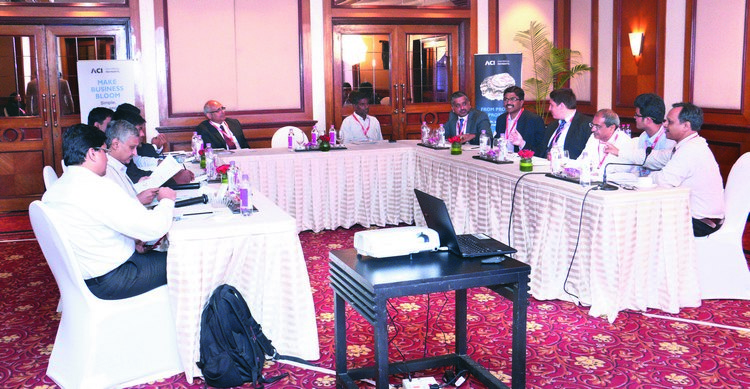Payment system functionaries, payment system providers and select business heads involved in payments systems participated in a roundtable on Payments OCFP organized alongside PayNext Insights 2016. Edited excerpts of the deliberations of the session
Siddharth Dhamija Chief Growth Officer, RazorPay
Jignesh Gandhi COO, Essel Finance
Jiji Mammen CEO, Mudra Bank
Sumit Chhazed Co-founder, CREDR
K.R. Bijumon CGM, Muthoot Finance
Utul Kapadia Partner/Director, CreditOne Payments
Palani Govindrajan Chief Risk Officer, TechProcess
Probhir Roy Director, Paymate
Amit Bansal Director, Citrus Pay
Pratik Agarwal National Head, Products, Indostar Capital
Peter Moedlhammer Principal Product Manager, ACI
Shekhar Ganapathy GM, South Asia Region, ACI Worldwide
Manoj Agrawal Group Editor, Banking Frontiers (Moderator)

Manoj Agrawal: eCommerce and mCommerce offer many conveniences today. We are moving to an eco-system where cash is becoming less preferred. In businesses also, definitely we need to move into the electronic and digital payments highway. If we look at India’s fastest growing companies, we can see they are digital-based companies.
Siddharth Dhamija: Going global is a dream for every company. But most of the companies while expanding the market to overseas, are trying to replicate the business model they have in the domestic market. When we move to foreign market, we should be aware of the culture and environment of that market.
Shekhar Ganapathy: It is the responsibility of payments players to allow Indian companies to globally pass on their products and services. eCommerce reduces the friction and cost of doing this especially on services but also on manufacturing. Barriers of customs are slowly falling. If we have a compelling product and the world is your marketplace, we need to have the ability to facilitate transactions.
Jignesh Gandhi: We are segmenting the market such as Indian, Middle East, African etc. It is time to change our mindset. We have to see the world as our market. With today’s electronic environment, we can position our products in multiple markets simultaneously.
K.R. Bijumon: If we set up cost heavy products abroad, it would be very difficult to sustain. We should use technology and should have a good platform to go to foreign markets. The regulatory aspects of the foreign market have to be well examined before overseas expansion.
Utul Kapadia: To expand abroad, regulatory compliance is something that is challenging. One other challenge while going abroad is taxation. Every government wants to tax you locally.
Palani Govindrajan: Before going global, the important thing to consider is that whether you have understood the pulse of the customer. This is different in underdeveloped, developing and developed geographies. The mindset of a particular country may not work according to our product design. Before going global we have to fully understand the domestic market.
Manoj Agrawal: When operating in India, we can handle the entire operation with a single currency. When we go global, we need to deal with different currencies. We need to understand whether technology is able to deal this issue.
Peter Moedlhammer: In Europe, we have Eurozone that allows operating with a single currency across the countries. In other countries, there is no way. We have to accept local currencies.
Shekhar Ganapathy: Each country has its own payment method and preference. So it is the payment method and currency preference which require being addressed to meet a country’s need.
Siddharth Dhamija: One of the missing links here is the use of technology to ease the transactions. Today, currency is like a black box. A customer has no real idea as to how much will be eventually charged, how much was the charge in the past etc. This is the space where eCommerce vendors or banks need to enable technology to do real-time analysis of data for the end customer.
Probhir Roy: Everybody makes a quick arbitrage on the currency rate things. They are embedded into financial system’s DNA. Companies like MasterCard and American Express run their business based on what the bank gives as rate and what actually they transfer. That is their business model. Whoever disrupts that, which will happen one day, will threaten that model.
Amit Bansal: One another important aspect is that what kind of merchant we are talking about. If we are talking about a high-frequency low-value kind of merchant, then wallet use cases are more acceptable. If it is a high-value low-frequency kind of transaction, then we are not seeing wallet as a transaction mode getting accepted at that level. From the merchants’ perspective, they are slightly confused about the different modes of payments the aggregator brings in.
Pratik Agarwal: There are multiple vendors, multiple gateways, multiple wallets and multiple banks. Everything is getting very fast paced that everybody wants to catch up with others. The fraud assessment is somewhere missed in between catching up the market. We need to address fraud in a better way. We need to define what are those PIN numbers that are generated, how is the linking of API, how secure is the API etc.







